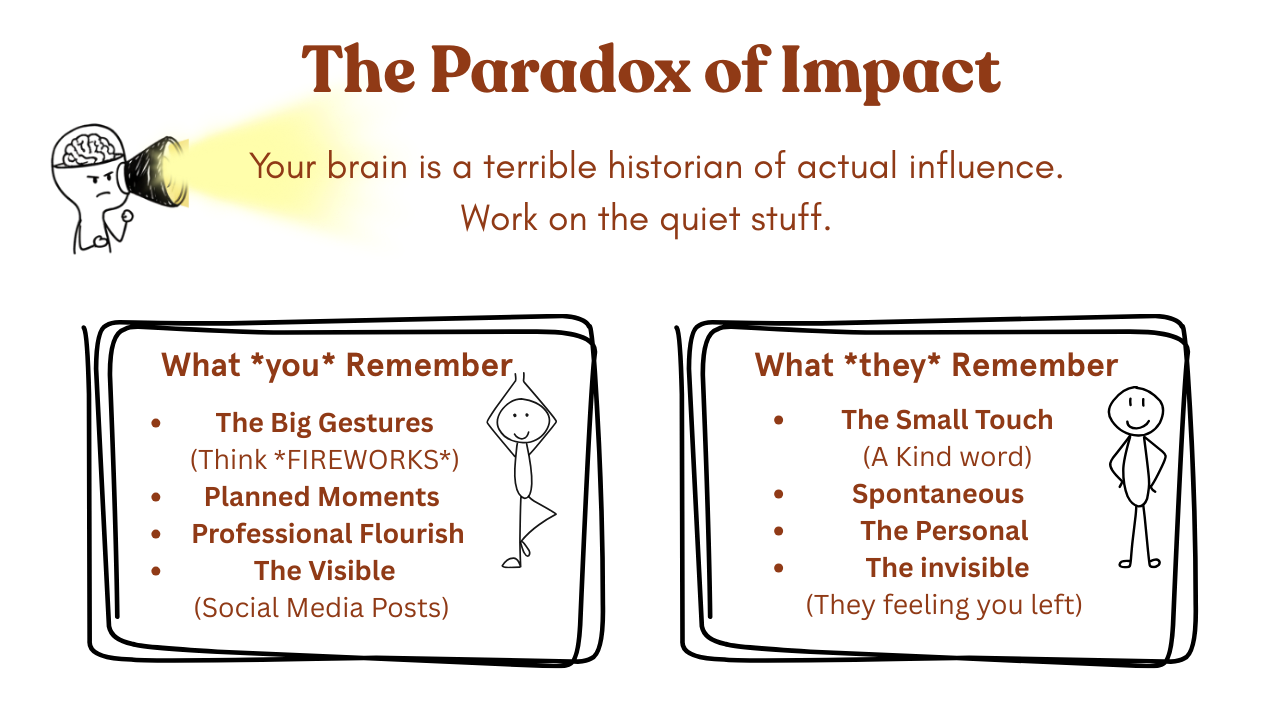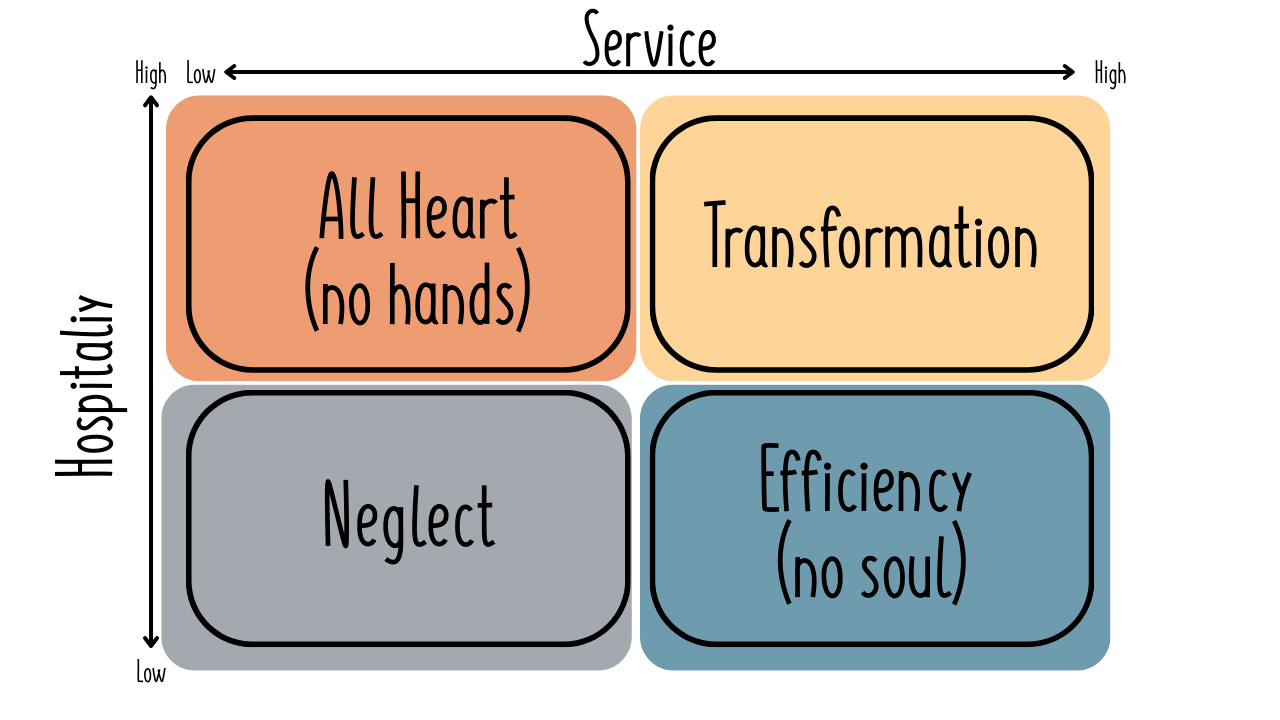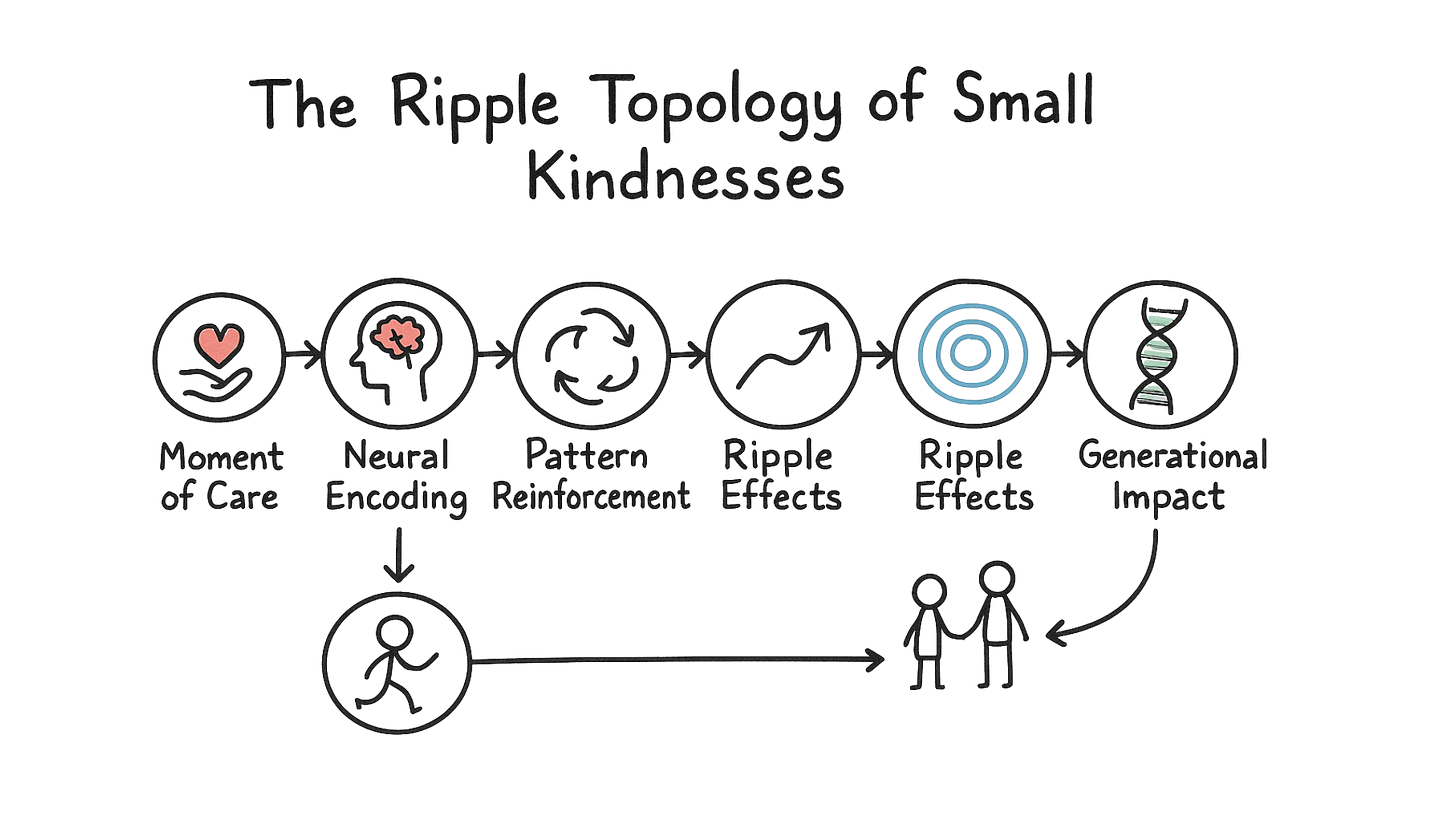The Hospitality Paradox
When Care Costs Nothing but Changes Everything
Part 1: The Archaeology of a Moment
The man entered the dining room quietly, almost reverently. Sitting down, he breathed in and exhaled.
His eyes scanned the room until he saw her — the woman moving table to table while people smiled, chewed, laughed, and delayed leaving, not wanting the experience to end.
He gently raised his hand and locked eyes with her. She paused her work and stepped beside his table.
“You don’t recognize me, do you?”
She shook her head slowly, quiet and unsure what might come next.
“A year ago, you handed me a card with a short handwritten note,” he said, eyes welling with memory. “You probably don’t remember what it said. But I do.”
He reached into his front pocket and pulled out the note—creased, worn, the ink still legible.
“I’ve carried this with me every single day since. My mother had just passed unexpectedly. I was broken. That note gave me strength I didn’t think I had.”
She stood stunned.
When he produced that note, the moment fractured time in a peculiar way.
Suddenly, she was an archaeologist of her own forgotten kindness, excavating a memory she’d buried beneath a thousand other interactions.
This is what I've come to understand as The Hospitality Paradox: The moments that matter most are often the ones we're often least conscious of creating.
We are all walking around as unaware architects of other’s experiences, leaving breadcrumbs of presence that might just become someone's entire lifeline.
Part 2: Deconstructing the Mythology of Service
Most of us operate under a fundamental category error when we think about hospitality.
We've been conditioned to see it through the lens of a simple transaction, experience optimization, and increased customer satisfaction scores. We see hospitality simply as the machinery of modern service culture.
But what if we're asking the wrong question entirely?
Instead of "How do we deliver better service?" what if we asked: "How do we create conditions for human flourishing in the small spaces where human lives intersect?"
Let me show you the architecture of this distinction:
The ancient Greek word philoxenia, or “love of the stranger,” isn't about hospitality industry best practices. It's anthropological. It's about how we recognize and respond to the Imago Dei in the person across from us, especially when that person is unfamiliar, difficult, or inconvenient.
This isn't simple sentiment. It's a subversive philosophy disguised as customer service.
Service asks: “Did we deliver?”
Hospitality asks: “Did they feel seen?”
Part 3: The Phenomenology of Failure (Or: How I Became a Case Study in Anti-Hospitality)
I need to tell you about the most instructive moment of my professional life. This was the moment I discovered my capacity for profound human failure.
It was the “Cold Fry” Incident. Sounds minor, right? But embedded in that moment was every mental trap that derails authentic presence.
Here's what happened: faithful customers Glen and Cindy complained about cold fries. Instead of seeing this as vital information about their experience, I processed it as criticism of my competence and personal worth. My ego, that beautiful defense mechanism, immediately activated its most sophisticated weapon: intellectual superiority.
I fired off an email telling them never to eat at our restaurant again.
The response here is deeply human. When we feel our competence questioned and threatened, we often choose being right over being present. We optimize for self-protection rather than connection.
But here's the meta-insight: That email was a perfect inversion of hospitality. Instead of creating space for the other and drawing people to myself, I eliminated the space and pushed people away. Instead of dignifying their words and experience, I closed my ears and quickly dismissed it. Instead of humbly listening to the deeper parts of their words, I asserted my superiority and shut them out.
Months later, Cindy cornered me in the dining room with surgical precision—"You told my husband and me never to eat here again!”
I experienced what I can only describe as the brutal gift of painful clarity.
That afternoon, staring at a fresh basket of fries (steam rising, golden edges, perfect in every way), I understood: They hadn't wanted a dissertation on the complexities of restaurant operations. They'd wanted hot food served with care. They'd wanted to be seen.
The path back required the hardest technology to use in my toolkit: confession.
Not the corporate non-apology ("We're sorry you feel that way"), but the kind of vulnerability that creates space for restoration. "I was wrong. Can you help me understand?"
Today, Glen and Cindy are regulars. Their thank-you note sits on my desk as a daily seminar in humility and the psychology of memory and attention.
Part 4: The Hidden Curriculum of Excellence
What captivates me about the hospitality leaders who've cracked this code is how they've intuited their way into ancient wisdom without always recognizing it as such.
Take Danny Meyer's counterintuitive hierarchy:
Employees
Guests
Community
Suppliers
Investors
This isn't just good business strategy—it's actually praxis.
Meyer has discovered that the health of the inside determines the authenticity of the outside. As much as you might try, you cannot manufacture presence. You can only create the conditions where it emerges naturally.
Or consider Will Guidara's hot dog revelation. When guests mentioned wanting to try a New York hot dog, Guidara didn't see this as outside his restaurant's scope. Instead, he saw it as an invitation to transcend the ordinary limitations in service of human delight.
That moment of sprinting outside, purchasing street cart hot dogs, and serving them on Michelin-starred plates wasn't about showmanship. It was about the courage to prioritize human connection over institutional boundaries.
But here's what's essential about this story: The gesture only works if it emerges from genuine care. The moment it becomes performance, it transforms into manipulation. The difference between hospitality and theater is the presence (or absence) of authentic intention.
Part 5: The Liturgy of Small Things
Here's where I want to zoom way out and then come back to the tactical.
What we're really talking about when we talk about hospitality is the spirituality of attention. Every interaction is a choice: Will I see the person in front of me, or will I experience them as a transaction, a number, or my next dollar to be gained?
At Ritz-Carlton hotels, cofounder Horst Schulze created a famous empowerment rule: every employee was trusted to spend up to $2,000 per guest, per incident, without needing a manager’s approval, to solve problems or create memorable moments.
He wasn't just creating operational efficiency—he was institutionalizing permission to be human and treat people as human.
When you give a housekeeper authority to spend significant resources to solve a guest's problem, you're actually making a theological statement: Every human being in this system carries the dignity and responsibility to create conditions for human flourishing.
Most organizations operate at Level 1 or 2. The breakthrough happens when you systematize Level 4—when exceptional humanity becomes ordinary practice.
In that spirit, I’m reminded of Wendell Berry, who often wrote that to be truly present is to live as if every small kindness is a seed planted in a riverbank.
We may not see how far downstream that seed will travel, but it will become part of the landscape of someone else’s life. As Berry put it:
the soil under the grass
is dreaming of a young forest,and under the pavement the soil
is dreaming of grass.
Berry’s vision reminds us that hospitality isn’t just a transaction. It’s about tending to the hidden currents of human connection, knowing that the smallest gestures of attention can ripple out into a future we may never see.
Part 6: The Psychology of Memory and Attention
What fascinates me about that man with the note in our dining room earlier this year is how he became a walking laboratory for the delayed-release impact of presence.
For an entire year, the forgotten gesture had been doing quiet psychological work in his life. Each time he touched that paper, memory and attention likely re-evoked the feeling of being cared for, reinforcing hope, connection, possibility.
My team member had unknowingly become part of his neural architecture of survival.
As Wendell Berry’s Jayber Crow reflects, “Often I have not known where I was going until I was already there. Only when I look back do I see the pattern.”
This is what I mean when I say hospitality is often invisible until revealed in retrospect.
We're all engaged in the mysterious work of shaping each other's internal landscapes, mostly without conscious awareness.
The man with the note represents thousands of similar interactions happening every day, most of which we'll never trace back to their origins. We're all walking around as unwitting co-architects of each other's stories.
Part 7: The Practical Mysticism of Daily Practice
So how do you operationalize the mystery of hospitality? How do you systemize the seemingly unsystematizable?
Through what I’ll call incarnate presence. The powerful spiritual elements of hospitality made flesh in everyday moments.
Pre-Presence: Before anyone arrives, spend time considering who might walk through your doors today. What invisible burdens might they carry? How can you create space for whatever they need?
The Double-Check Doctrine: Excellence in the small things isn't perfectionism. But it does mean we should aim for excellence. Hot food served hot. Clean spaces maintained clean. Details attended to not just to entertain or serve ourselves, but because people matter.
Permission Architecture: Build systems that empower everyone to make things right immediately. Don't make people wait for hierarchical approval to be human.
Sabbath Integration: Understand that presence requires reserves. Burned-out people cannot give what they don't have. Rest is a prerequisite for authentic hospitality. There’s a reason Chick-fil-A is closed on Sundays.
The Generosity Budget: Set aside resources specifically for unreasonable kindness. Budget for beautiful moments. Yes, you can plan for spontaneous love. Be ready for the opportunities.
Graceful Boundaries: Learn to say "not here, not now" with dignity intact. Love includes protection, both for guests and staff.
Part 8: The Measurement Problem
Here's where most organizations get trapped: They only measure what's quantifiable rather than what's meaningful.
Standard metrics capture efficiency but miss transformation. Speed of service but not depth of connection. Customer satisfaction but not human flourishing.
Both matter. But if you only measure the left column, you'll optimize for transaction rather than transformation.
The stories that matter most—the notes carried in pockets, the reconciliations that heal wounds, the moments when strangers become neighbors—these resist quantification. But they're the reason hospitality exists.
Part 9: The Long View of Love
Here's what I want you to see when you zoom all the way out:
That crumpled note in that man's pocket isn't just about one interaction between two people. It's connected to a 2,000-year tradition of radical presence. Every time someone chooses to see the person in front of them rather than process them as a function, they're participating in this ancient practice.
Jesus washing feet. St. Benedict receiving guests as Christ. Modern servers writing notes to grieving strangers.
This is the thread that connects them all: the choice to dignify the other through presence.
In our age of algorithmic optimization, artificial efficiency, and transactional everything, choosing hospitality—real, costly, and even inefficient hospitality—becomes a form of resistance against a broken and empty culture.
You're not just serving food or solving problems. You're not just building a business or creating customer loyalty.
You're bearing witness to the possibility that humans can see each other, create space for each other, serve each other—not because it's profitable or efficient or measurable, but because each man and woman has been made in the very image of God.
The man who lost his mother still carries that note. Glen and Cindy still laugh with me during lunch. My dining room hostess still writes small cards to customers, most of which disappear into the great forgetting of ordinary days.
Some disappear forever. Others become lifelines. Some become proof that presence, however small, however forgotten, however unmeasurable, changes everything.
And in a world increasingly designed to make us strangers to each other, that's not just good hospitality.
That's revolutionary love disguised as customer service.
As N.T. Wright reminds us: “Love is never wasted, for its value will always outlast time itself.”
Which might be exactly what the world needs right now.








